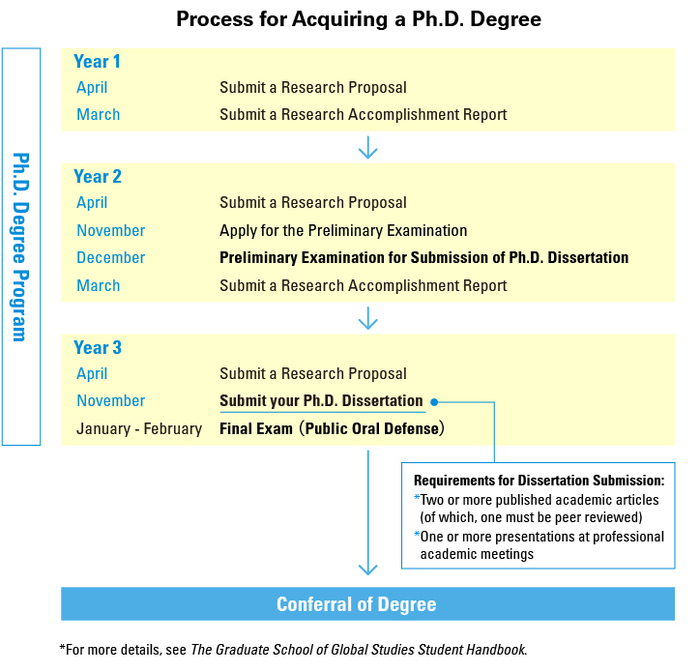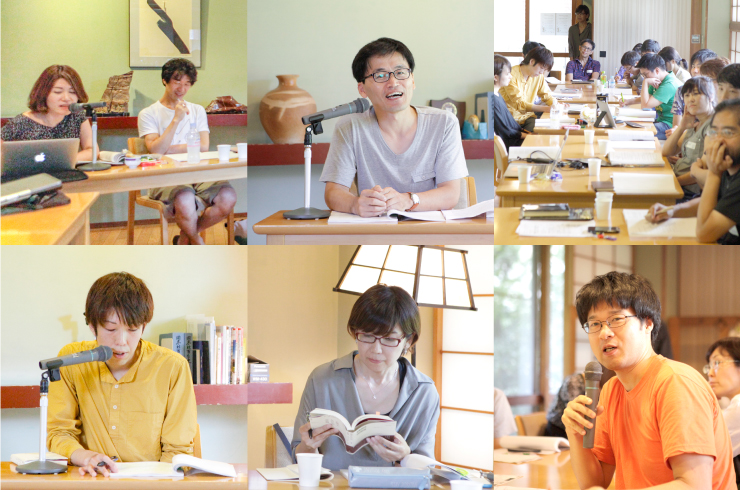Doctoral Course

Curriculum
The Graduate School of Global Studies is an independent graduate school (without undergraduate program) that engages in graduate education (Master’s and Ph.D.) with the aim of developing human resources with advanced expertise to work in academic institutions or international organizations. In the Ph.D. Program in particular, in addition to the main advisor’s meticulous mentoring on dissertation in seminars, “Doshisha University Society of Global Studies” holds its annual conference to give students an opportunity to report their research progress and receive advice from academic staff other than their main advisor. The Ph.D. Program also encourages students to present at related academic conferences and submit articles to academic journals as well as requires them to submit the research plan once a year, to monitor their research progress and ensure steady development of their dissertation writing.
Meanwhile, Doshisha University as a whole provides career support to graduate students mainly at its Career Center, as well as having the positions of “Doshisha University Assistant Professor (Non-Tenured Researcher),” “Assistant (Non-Tenured Researcher)” and “Assistant with Foreign Nationality” available, to support their career path after completing the Ph.D. program.

Requirements for Ph.D Dissertation Submission
Those who intend to submit the Ph.D Dissertation must in principle fulfill the following three requirements.
-
- ①
-
Two or more published academic articles (of which, one or more must be peer reviewed).
- *
- Two peer-reviewed research notes are considered equivalent to one peer-reviewed article.
-
- ②
- One or more presentations at professional academic meetings.
-
- ③
- Must pass the Ph.D. Dissertation Preliminary Examination.
Graduate Student’s Life

K.N. Ph.D. Candidate
I am studying the history of the food policy and cooking experts in post-war Japan in the Doctoral Program.
I am currently writing my doctoral dissertation little by little, and at this stage, my schedule has become quite flexible. Everyone has their own unique way of working on their research, and I am trying to maintain a regular pattern of a week that I feel comfortable with as much as possible.
My typical week roughly consists of: ① days that I spend proceeding with my own research,② days that I attend seminars for discussion, and ③ days that I do part-time work.
For ①, I usually do a research on topics of my interest at the time through books and the internet and write what I find out in my dissertation. Materials that I need often turn out to be only available in a distant library or archive, in which case I adjust my schedule and go out in search of the necessary materials. Once I have the materials I need, I read them carefully and put my thoughts in writing. Then, I put them together to compose my dissertation little by little.
For ②, I attend my seminar class about once a week. Over a few hours of the seminar, students in the same class share how each other’s work is progressing. Attending the seminar usually requires prior preparation, such as setting a discussion topic in the case I am giving a presentation on the day, or reading prepared materials in advance if other students are presenting. Discussing each other’s research topic with other students in the seminar gives me ideas to proceed with my dissertation.
For the rest of the week I work part-time to make a living. I mainly do part-time work on weekends so that I can have a well-organized week, doing my own research during the first part of the week, attending a seminar in the middle and working in the last part.
|
Master Course Doctoral Course List of Doctoral Thesis Advanced Liberal Arts |